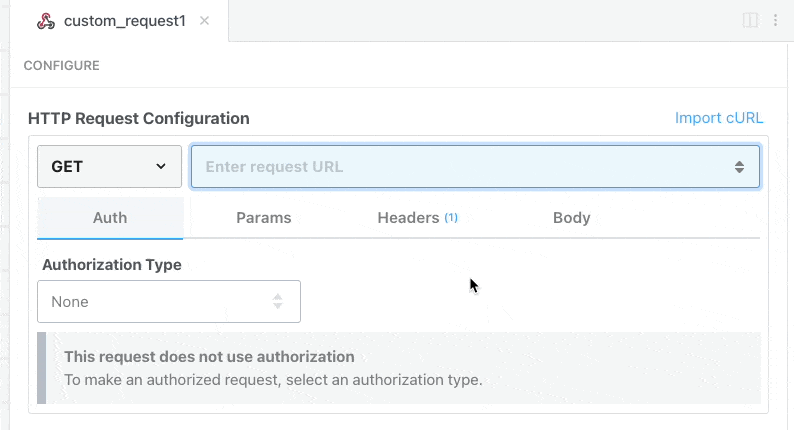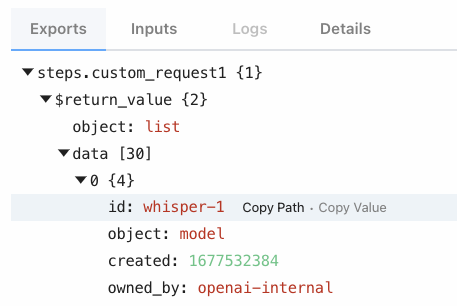What do you want to automate
with Linkish and HTTP / Webhook?
Prompt, edit and deploy AI agents that connect to Linkish, HTTP / Webhook and 3,000+ other apps in seconds.
Trusted by 1,000,000+ developers from startups to Fortune 500 companies
Popular Linkish and HTTP / Webhook Triggers#
Get a URL and emit the full HTTP event on every request (including headers and query parameters). You can also configure the HTTP response code, body, and more.
Get a URL and emit the HTTP body as an event on every request
Emit new event when the content of the URL changes.
Popular Linkish and HTTP / Webhook Actions#
Send an HTTP request using any method and URL. Optionally configure query string parameters, headers, and basic auth.
Send an HTTP GET request to any URL. Optionally configure query string parameters, headers and basic auth.
Send an HTTP POST request to any URL. Optionally configure query string parameters, headers and basic auth.
Send an HTTP PUT request to any URL. Optionally configure query string parameters, headers and basic auth.
Use with an HTTP trigger that uses "Return a custom response from your workflow" as its HTTP Response
Overview of Linkish#
Linkish is a versatile API that enhances the way you handle web links. It allows you to organize, preview, and optimize web links with features such as URL shortening, web page metadata retrieval, and link previews with screenshots. With Pipedream, you can create powerful automations by connecting Linkish to other services to streamline content sharing, web research, and digital marketing workflows.
Connect Linkish#
module.exports = defineComponent({
props: {
linkish: {
type: "app",
app: "linkish",
}
},
async run({steps, $}) {
const axios = require('axios');
let access_token = "";
// Card details
let type = "link", // either "link" or "text"
url = "https://www.youtube.com/watch?v=dQw4w9WgXcQ", // required if "type" is "link"
title = "", // card title, if empty it will be scraped from "url"
description = "", // card description, if empty it will be scraped from "url"
thumbnail = "", // preview image URL, if empty it will be scraped from "url"
parent = "", // collections[index].id recieved from get-collection API
tags = []; // an array of strings, items can also have comma separated strings
// Get access token based on the linkish API key
return await axios({
method : "POST",
url: "https://api.linkish.io/get-token",
data : JSON.stringify({
"api_key": this.linkish.$auth.api_key
}),
headers: {
"Content-Type": "application/json",
"Accept": "application/json",
}
}).then(async (response) => {
// Get collections based on the access token
access_token = response.data.token;
return await axios({
method : "GET",
url: "https://api.linkish.io/get-collections",
headers: {
"Authorization": `Bearer ${access_token}`,
}
})
}).then((response) => {
// Return the data as the step export
return response.data;
}).then(async (collections) => {
// Change parent collection ID here or keep it empty for adding links to root collection
parent = collections[0].id;
// Save link in linkish dashboard
return await axios({
method : "POST",
url: "https://api.linkish.io/save-link",
data : JSON.stringify({
"type": type,
"url": url,
"title": title,
"desc": description,
"thumbnail": thumbnail,
"parent": parent,
"tags": tags,
}),
headers: {
"Authorization": `Bearer ${access_token}`,
"Content-Type": "application/json",
"Accept": "application/json",
}
})
}).then((response) => {
// Return the data as the step export
return response.data
})
},
})
Overview of HTTP / Webhook#
Build, test, and send HTTP requests without code using your Pipedream workflows. The HTTP / Webhook action is a tool to build HTTP requests with a Postman-like graphical interface.

Point and click HTTP requests
Define the target URL, HTTP verb, headers, query parameters, and payload body without writing custom code.

Focus on integrating, not authenticating
This action can also use your connected accounts with third-party APIs. Selecting an integrated app will automatically update the request’s headers to authenticate with the app properly, and even inject your token dynamically.

Pipedream integrates with thousands of APIs, but if you can’t find a Pipedream integration simply use Environment Variables in your request headers to authenticate with.
Compatible with no code actions or Node.js and Python
The HTTP/Webhook action exports HTTP response data for use in subsequent workflow steps, enabling easy data transformation, further API calls, database storage, and more.
Response data is available for both coded (Node.js, Python) and no-code steps within your workflow.

Connect HTTP / Webhook#
// To use any npm package on Pipedream, just import it
import axios from "axios"
export default defineComponent({
async run({ steps, $ }) {
const { data } = await axios({
method: "GET",
url: "https://pokeapi.co/api/v2/pokemon/charizard",
})
return data.species
},
})
Community Posts#

